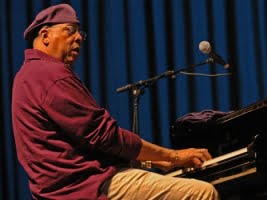As the Cuban maestro prepares for BRIC Celebrate Brooklyn! on Wednesday, here’s the story behind his influential project Jazz Batá.
On Familia: Tribute to Bebo and Chico, released last year, he joined forces with Arturo O’Farrill to celebrate the legacies of their fathers, who were in the first rank of Cuban jazz royalty.
Chucho’s father, Bebo Valdés, was among the key figures in the midcentury golden age of nightlife in Havana — a prominent pianist; a house arranger at the Tropicana Club; leader of a popular orchestra, Sabor de Cuba. He fled Cuba in 1960, after the Castro revolution, and ended up in Stockholm, Sweden.
Chucho stayed in Havana, where he became one of the most accomplished Cuban musicians of his generation — the founder of Irakere, a barnstorming supergroup, and a virtuoso who eventually assumed the regal bearing of a statesman. He had little contact with his father prior to a reunion captured in the 2000 film Calle 54, which effectively formed the emotional center of the film.
Now Chucho Valdés has a new album, Jazz Batá 2, that burnishes his stature as a towering Afro-Cuban pianist of our time, while reclaiming a meaningful chapter from his past. The album is out on Mack Avenue Records, which shared one track here as an exclusive premiere: “100 Años de Bebo,” or “100 Years of Bebo,” featuring violinist Regina Carter.
The song’s title is a nod to Bebo Valdés’s centenary, which falls on Oct. 9. (Chucho has the same birthday; he’ll be turning 78.) A danzón-mambo with a lilting melody exquisitely played by Carter, it’s a composition that holds sentimental associations.
“No one’s heard this tune,” Valdés says in a press release. “I’m the only person who knows it. When I was a child, Bebo played it on the piano at home. Just a tune, very beautiful, and as many times as he played it, it always captured my attention. I don’t believe he ever recorded it. Since it’s his centenary, I added an introduction, I put a tumbao at the end, and recorded it.” (Don’t miss the delirious “laughing” effect that Carter plays at the onset of the tumbao, just after the three-minute mark — and stay put for her marvelous solo, which leads to a show of mastery by Valdés.)
Apart from Carter, a guest who also graces a radiant track titled “Ochún,” the supporting personnel on Jazz Batá 2 consists strictly of musicians from the Guantánamo region of Cuba: longtime Valdés associate Yaroldy Abreu Robles on percussion; Yelsy Heredia on bass; and Dreiser Durruthy Bombalé on batá drums and vocals.
As the title implies, Jazz Batá 2 is also a sequel — to Jazz Batá, an album that Valdés released in 1972, for the Cuban label Egrem. A forward-thinking experiment in cultural convergence, that album paired modern jazz piano with the earthy thrum of the batá, an hourglass-shaped drum adapted from Yoruban religious practice. The percussionist on the album was Oscar Valdés (no relation), and the bassist was Carlos del Puerto. Both became founding members of Irakere, whose explosive success eclipsed the acoustic sound of Jazz Batá, rendering it a kind of curio.
But the Afro-Cuban jazz of our current moment often bears a clear connection to the ideas that Valdés was exploring with Jazz Batá. Master Cuban musicians like Román Díaz, who plays batá drums in and out of his band Rumba Habanera, have made manifest the pull of folkloric rhythm. Modern bandleaders from Yosvany Terry to David Virelles have foregrounded it in their compositions.
So there should be a place for Jazz Batá 2, which comes on the heels not only of Familia but also Tribute to Irakere (Live in Marciac). Valdés has been touring with this project.








More Stories
CD review: George Benson – Dreams Do Come True: When George Benson Meets Robert Farnon – 2024: Video, CD cover
The band was tight as ever. The Warren Haynes Band cuts loose: Video, Photos
Interview with Alvin Queen: Feeling Good – I heard these tunes played by … Video, new CD cover, Photos